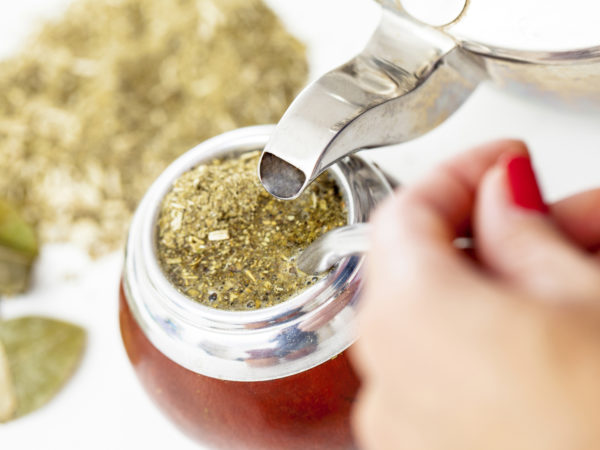Is Yerba Mate Tea Healthy?
What can you tell me about yerba mate tea? I’ve heard that it is good for bones and may protect against colon cancer. True?
Andrew Weil, M.D. | May 7, 2012

Yerba maté (also known simply as maté) is a tea made from the dried leaves of Ilex paraguariensis, an evergreen shrub in the holly family that grows in Central and South America. Maté (pronounced MAH-tay) is most abundant in Paraguay, where it has been the centuries-old drink of the Guarani Indians as well as a traditional treatment for everything from fatigue to appetite control to a weakened immune system. Traditionally, it is drunk sweetened from a gourd (mat´e) through a silver straw.Many varieties have a distinctly smoky taste.
Maté contains xanthines, a class of chemical compounds that includes caffeine as well as theophylline and theobromine, the stimulants in tea and chocolate. Some scientists contend the primary type of xanthine in maté is actually “mateine,” a compound they say is chemically similar to caffeine but with slightly different effects. Some South American researchers claim that unlike caffeine, mateine induces sleep, and while it’s a stimulant, doesn’t trigger the jitteriness associated with caffeine. I don’t agree with them.
Recent evidence does suggest that drinking maté preserves bone mineral density in postmenopausal women, a surprising finding since caffeine is believed to contribute to bone loss and an increased risk of fractures. A study from Argentina published in the January 2012 issue of the journal Bone compared 146 postmenopausal women, some of whom who drank one liter of yerba maté tea daily for five years and some of whom didn’t. (The researchers excluded women whose health history put them at high risk for osteoporosis.) Results showed that the yerba maté drinkers had 9.7 percent higher bone density in their lumbar spine and 6.2 percent higher bone density in the area of the thigh just below the hip joint (this area is called the femoral neck) than the women who didn’t drink the tea. In another study, women who drank Chinese tea also had higher bone density in these two sites compared to women nondrinkers of tea; the increases were 4.3 percent and 4.7 percent respectively.
As far as colon cancer is concerned, findings from the University of Illinois suggest that bioactive compounds found in one cup of maté tea can disrupt colon cancer cells, at least in the lab. Researchers exposed human colon cancer cells to caffeine derivatives from yerba maté. They found that the cancer cells self-destructed due to DNA damage from the caffeine derivatives, and that these same compounds also reduced important markers of inflammation. Even though these were only test tube studies, the investigators concluded that there is “ample evidence” to consider drinking yerba maté tea for these potential benefits, particularly if you’re worried about your colon cancer risk. Their findings on the effects of maté tea on the development of colon cancer in rats are awaiting publication.
Andrew Weil, M.D.










